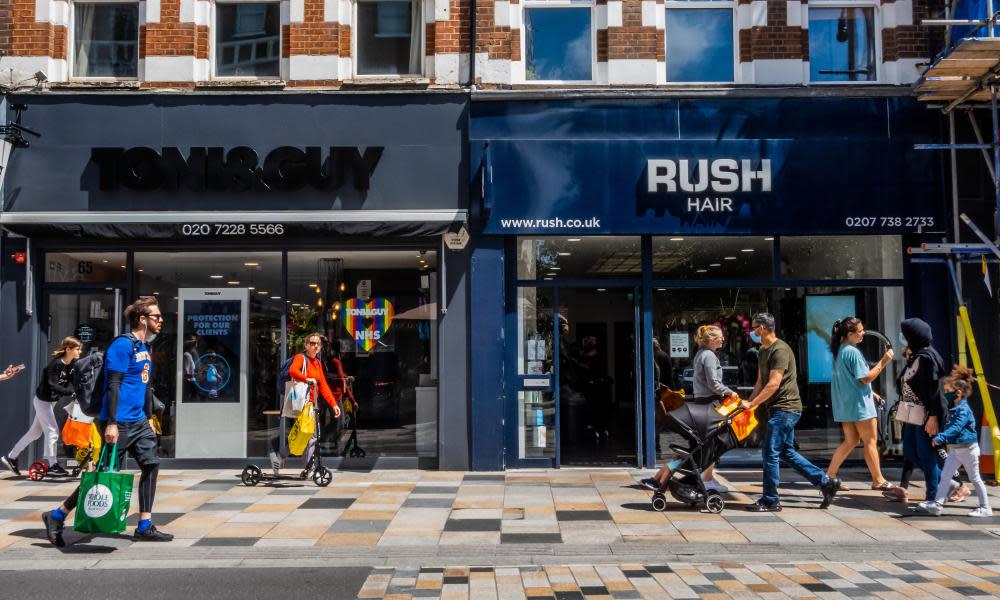Chancellor under pressure to boost financial support as job crisis looms

The chancellor, Rishi Sunak, is coming under growing pressure to unleash more financial support to stop Britain plunging into the worst jobs crisis for a generation, as figures showed high streets remained quiet on Saturday despite the easing of lockdown measures in some parts of the country.
Although pubs, restaurants and hairdressers were allowed to open across England for the first time since March, industry data show that visits to town and city centres on Saturday were down by more than half compared with a year ago. In central London, footfall was 75% lower than in 2019.
Related: Fears of widespread disorder unfounded as English pubs reopen
Sounding the alarm as businesses reopened, the bosses of Britain’s biggest hospitality firms warned that government financial support would be required well into next year to prevent a new surge in redundancies.
In an intervention ahead of the chancellor’s statement on Wednesday, more than 120 leading industry figures from the sector – including the bosses of Pizza Hut and Burger King in Britain, and the chief executives of major hotel and pub chains such as Mitchells and Butlers, Fullers and Hilton – said more tax cuts and grants were required to save jobs.
The industry’s trade body, UKHospitality, estimates that sales across the sector will be 56% lower in 2020 than last year, costing companies as much as £73.4bn in lost income. The firms said as many as half of all businesses in the sector do not expect to break even until the end of next year, highlighting an urgent need for further government assistance.
The warning came as figures from Springboard, which measures the number of potential customers heading to retail and hospitality outlets, showed that evening footfall on England’s high streets shot up by more than a third on the first day of trading since lockdown for pubs and bars from a week earlier.
Related: Sunak considers £500 vouchers for all UK adults to spend in Covid-hit firms
However, visitor numbers overall were down sharply from a year ago, as many venues remain closed and as large numbers of people stay away due to the continuing risks to health from Covid-19. The number of visits to English high streets on Saturday was down 56% on the equivalent day in 2019. With tougher restrictions still in place, footfall in Scotland and Wales was even lower.
Expectations for a blockbuster mini-budget on Wednesday have been downplayed by government sources, as ministers wait to see how the country responds to the easing of lockdown. Sunak is believed to favour relaxing restrictions as the most effective way to get businesses back on their feet, rather than continuing with emergency financial support that is costing the exchequer billions of pounds each week.
The chancellor is however expected to announce a raft of measures on Wednesday to follow on from Boris Johnson’s “new deal” speech a week ago, including £111m of funding for new traineeships to help thousands of young people to find work.
Traineeships last from six weeks to six months and help to teach young people maths, English and CV writing skills, as well as to guide them on what to expect in the workplace and offer them a work placement of 60-90 hours.
The chancellor is expected to say that as much as three times more funding will be made available to training providers this year, helping to triple the number of trainees in Britain as job opportunities become more scarce. Businesses will also be in-line for a £1,000 bonus for every trainee offered a work placement.
But as more companies make job cuts and the country looks to be heading for the deepest recession in living memory, the chancellor has been warned by business leaders, Labour and trade unions to take further action to avert a jobs catastrophe.
More than 24,000 jobs already have been lost at high street retailers in the first half of this year, according to figures from the Centre for Retail Research. Across all sectors of the economy, the New Economics Foundation estimates unemployment could hit 2.2 million by the end of next year, more than 900,000 more people than at the end of 2019 before the coronavirus crisis struck.
Faced with the mounting risks to employment, the heads of Britain’s biggest trades unions, together representing 5.5 million workers, issued a joint statement warning the government it had only a “very short window of time” to prevent hundreds of thousands of people from losing their jobs this summer.
Ahead of the chancellor’s set-piece speech, the heads of the TUC, Unison, Unite, GMB and Usdaw, said he urgently needed to announce the extension of the Treasury’s furlough scheme beyond its current deadline in October for businesses who have a viable future.
More than 9 million jobs have been furloughed at more than 1m companies since the introduction of the scheme in March, at a cost of more than £20bn to the public purse. However, the Treasury is preparing to wind down the scheme from the end of this month, and to close it altogether from the end of October.
The unions wrote: “This is crucial, especially in at-risk industries like the arts, aviation, aerospace, automotives and hospitality. And needs to be allied with a recovery plan for retail and the high street, which were struggling even before covid struck.”

 Yahoo News
Yahoo News 
